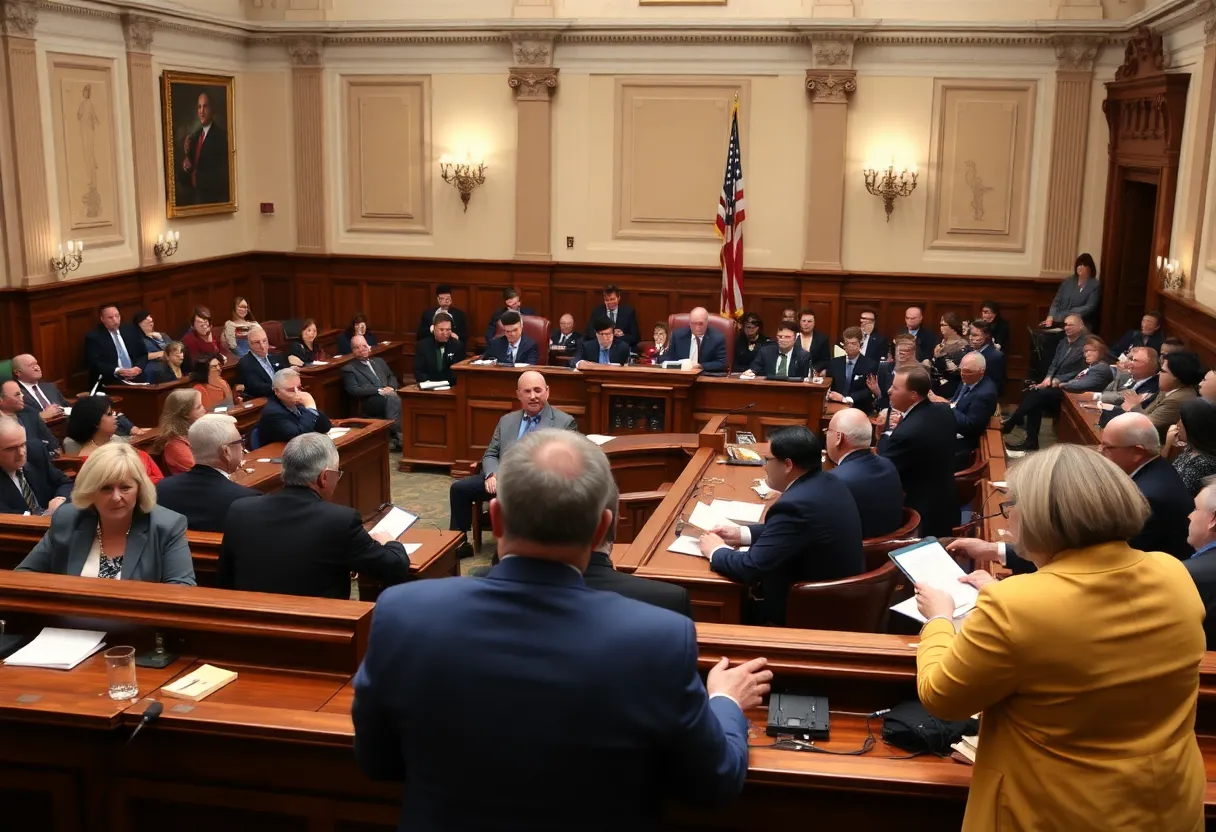News Summary
Arizona Governor Katie Hobbs has approved 34 bills and vetoed 23, impacting various sectors including health, education, and political transparency. The approved measures increase small claims court limits and streamline healthcare processes. Notable actions include new requirements for property assessments and restrictions on sharing nude images without consent. While some changes aim to enhance safety and accountability, others, like the vetoed bills on cryptocurrencies and immigration enforcement, have garnered criticism for their potential effects on privacy and public health. This legislative session reflects ongoing efforts to address significant issues in Arizona.
Arizona Governor Katie Hobbs has taken significant legislative action by approving 34 bills and vetoing 23 on a recent Friday. The approved legislation spans various topics including small claims court limits, health insurance, political signage, and other pressing matters affecting the state. The new measures are set to impact residents and local governance in several key areas.
One of the most notable changes is the increase in small claims court limits, allowing cases to be filed for amounts up to $5,000, an increase from the previous limit of $3,500. Additionally, penalties for fines and violations will now see an assessment increase from $2 to $4. In a move aimed at improving property assessments, county assessors will be required to establish property values for owners who no longer qualify for valuation protection.
On the health front, a new program for reviewing maternal mortality will replace the existing investigations by the State Child Fatality Review Team, highlighting a shift in focus towards monitoring pregnancy-related fatalities. Health insurance providers are also mandated to complete credentialing processes within 60 days after applications are received, further streamlining healthcare access. Moreover, those enrolled in health insurance must be informed about their rights to dispute surprise out-of-network bills, enhancing transparency in medical billing.
In terms of education, a notable adjustment allows teachers for blind students to acquire National Certification in Unified English Braille, thereby demonstrating their competency. Public universities’ medical schools will now prioritize admissions for Arizona applicants, ensuring that local talent has better access to medical education. Additionally, community colleges must include projected enrollment figures in annual reports and risk losing state funding if they offer courses focused on diversity, equity, and inclusion.
Other significant legislative actions include the removal of the five-year experience requirement for deputy fire marshals, facilitating quicker entry into the field. The criteria for identifying political signs have also expanded to include flags, updating the policy framework for political communication.
In a push for enhanced safety and privacy, sharing nude images without consent is now classified as illegal, addressing concerns around digital privacy. The state has also introduced provisions that will result in life-long injunctions for Class 6 felonies. Furthermore, truck drivers maneuvering larger vehicles are granted more flexibility by being allowed to deviate from their lanes during turns.
Under the approved legislation, public records requestors must confirm that the records are not intended for commercial use before accessing them, aiming to protect sensitive information. School officials have been granted the authority to request information regarding misconduct allegations against certified personnel to promote accountability within educational institutions.
A significant update for campaign financing sees deadlines adjusted for political action committees and parties, ensuring better regulatory compliance during election periods. Criminals deemed dangerous but incompetent to stand trial are now required to be housed in secure facilities if no other options are available, enhancing public safety measures.
While Governor Hobbs supported various measures, she also vetoed 23 bills that included topics such as cryptocurrencies and federal immigration enforcement requirements for state agencies. Critics have pointed out that many of the vetoed bills could have had negative implications for voter privacy, public health, and educational transparency, indicating a careful approach toward legislation that could disproportionately impact vulnerable populations.
The legislative actions taken by Governor Hobbs reflect an effort to address fundamental issues within Arizona, though they have sparked diverse opinions regarding their long-term effects on the community and governance.
Deeper Dive: News & Info About This Topic
- Phoenix New Times: Every Bill Arizona Gov. Katie Hobbs Has Vetoed
- Wikipedia: Katie Hobbs
- AZ Family: Gov. Hobbs Signs Bill Allowing Early Morning Construction
- Google Search: Arizona Governor Katie Hobbs
- Tucson.com: Arizona Legislative Actions and Impacts
- Encyclopedia Britannica: Arizona
- Havasu News: Hobbs Set to Smash Veto Record Amid Political Showdown
- Google News: Arizona Governor Katie Hobbs Legislation

Author: STAFF HERE PHOENIX WRITER
The PHOENIX STAFF WRITER represents the experienced team at HEREPhoenix.com, your go-to source for actionable local news and information in Phoenix, Maricopa County, and beyond. Specializing in "news you can use," we cover essential topics like product reviews for personal and business needs, local business directories, politics, real estate trends, neighborhood insights, and state news affecting the area—with deep expertise drawn from years of dedicated reporting and strong community input, including local press releases and business updates. We deliver top reporting on high-value events such as the Waste Management Phoenix Open, Cactus League Spring Training, and Arizona State Fair. Our coverage extends to key organizations like the Greater Phoenix Chamber of Commerce and Visit Phoenix, plus leading businesses in technology and healthcare that power the local economy such as Intel and Banner Health. As part of the broader HERE network, including HERETucson.com, we provide comprehensive, credible insights into Arizona's dynamic landscape.





